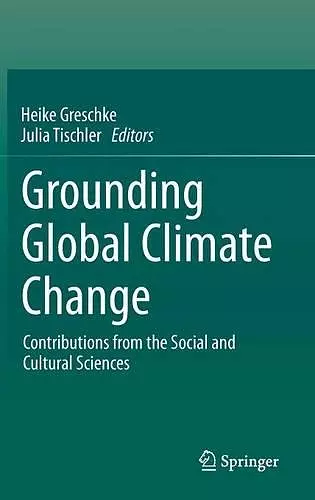Grounding Global Climate Change
Contributions from the Social and Cultural Sciences
Heike Greschke editor Julia Tischler editor
Format:Hardback
Publisher:Springer
Published:9th Oct '14
Currently unavailable, and unfortunately no date known when it will be back

This book traces the evolution of climate change research, which, long dominated by the natural sciences, now sees greater involvement with disciplines studying the socio-cultural implications of change. In their introduction, the editors chart the changing role of the social and cultural sciences, delineating three strands of research: socio-critical approaches which connect climate change to a call for cultural or systemic change; a mitigation and adaption strand which takes the physical reality of climate change as a starting point, and focuses on the concerns of climate change-affected communities and their participation in political action; and finally, culture-sensitive research which places emphasis on indigenous peoples, who contribute the least to the causes of climate change, who are affected most by its consequences, and who have the least leverage to influence a solution. Part I of the book explores interdisciplinarity, climate research and the role of the social sciences, including the concept of ecological novelty, an assessment of progress since the first Rio climate conference, and a 'global village' case study from Portugal. Part II surveys ethnographic perspectives in the search for social facts of global climate change, including climate and mobility in the West African Sahel, and human-non human interactions and climate change in the Canadian Subarctic. Part III shows how collaborative and comparative ethnographies can spin “global webs of local knowledge,” describing case studies of changing seasonality in Labrador and of rising water levels in the Chesapeake Bay. These perspectives are subjected to often-amusing, always incisive analysis in a concluding chapter entitled "You Ain’t Seen Nothing Yet: a death-defying look at the future of the climate debate." The contributors engage critically with the research subject of ‘climate change’ itself, reflecting on their own practices of knowledge production and epistemological presuppositions. Finely detailed and sympathetic to a broad range of viewpoints, the book sets out a profile for the social sciences and humanities in the climate change field by systematically exploring methodological and theoretical challenges and approaches.
“Grounding Global Climate Change considers the roles that the disciplines of anthropology, sociology, history, and social geography can play in studying and shaping an understanding of climate change. … The strongly theoretical focus of the work will make it most valuable to those with strong backgrounds in the social sciences and an interest in interdisciplinary research. Summing Up: Recommended. Graduate students and above.” (J. L. Rhoades, Choice, Vol. 52 (9), May, 2015)
ISBN: 9789401793216
Dimensions: unknown
Weight: 4144g
181 pages
2015 ed.